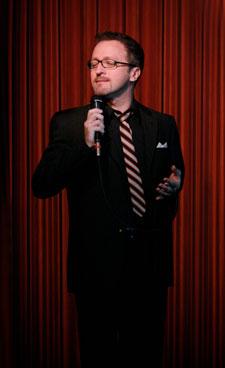With Toronto’s live music venues becoming as endangered as a Republican politician, it’s always heartening to hear of a club expanding its performance calendar. Statlers on Church St has done just that, opening up its posh second-floor space for a brand new cabaret series called Upstairs Cabaret. The room evokes the low-lit chic of a classic New York vocal club — something that organizer George Evans felt was missing in the Big Smoke.
“There were no cabarets in Toronto when I arrived,” Evans says. “What I love about a cabaret room is that I’m just one element of what this is about: It’s a collage of styles and idioms, but mainly a theatre performer space.”
Evans cut his teeth in the 1980s New York cabaret scene before transplanting to Canada to pursue a career as a jazz crooner. He drew upon memories of New York venues like the Oak Room and The Café Carlisle in setting the tone for the series, and feels that the new cabaret will complement the lounge’s downstairs jazz stage.
“There’s a great divide between cabaret and jazz,” he says, “but there’s also this vocal audience that sits between the two. Half of them are fans of jazz and half of cabaret. The audiences aren’t mutually exclusive.”
It took a while to set up, what with flitting to gigs in New York, Japan and Montreal. The more he played outside of the city, the more convinced Evans became that the idea would fly here in Toronto. He was adamant about limiting each show to one hour — not only in deference to audience favourites like Julie Michels and Kevin Barrett jazzing it up downstairs, but also to encourage a dramatic arc to each performance.
“What I love about this format is that the artist is obligated to condense their presentation into a one-hour show. You come in, you sit down, you eat and you see the show.
“Cabaret is about the size of the venue, the intimacy of the one-on-one performance and the concise nature of that one hour.”
It wasn’t just artistic altruism that led Evans to champion a cabaret resurgence in the city. The closure of live music standbys like the Montreal Bistro and Top of the Senator in the last few years has meant dwindling opportunities for even well-known crooners like Evans to make a living. A return to broadcasting and gigs in the States and overseas may pay the bills, but Evans was determined to keep singing here at home.
“The longer our clubs were gone, the more sick to my heart I became,” he says. “Occasionally I get so angry that I get motivated to do something — and this is it.”
Motivation has never been a problem with the boyish lad from Bloomington, Indiana. The son of classical music teachers, Evans studied musical theatre and dreamed of a life treading the boards before realizing that cast life wasn’t for him.
“I was working at a dinner theatre in New York and gradually realized that I don’t play well with others,” he laughs, “and I was not going to get any roles, given my physical size and my gayness.”
Moving to Montreal opened up a new world for Evans as he threw himself into the study of jazz music while moonlighting as a radio broadcaster.
“I’d always wanted to live in French Canada because it feels completely cut off from the rest of North America in a way,” he says. “What that gave me was the chance to be completely self- contained and figure out what I should be doing.”
Unfortunately, just as his star was starting to rise, Evans was waylaid by a benign growth in his voice box. Two surgeries and months of hard work restored his voice to its smooth, silky baritone and a subsequent CBC concert cemented his reputation as a versatile and talented vocalist. A strategic move to Toronto brought him to the attention of famed Toronto booking agent Sybil Walker, who helped establish him as one of the city’s top jazz crooners. But, despite the tours, several albums and enthralled audiences, Evans remains his own harshest critic.
“As an American kid I have an idea of what success and stardom is,” he says matter-of-factly. “I can only do what I can, given that I’m an aging gay guy who’s not a matinee idol.
“Sometimes it’s a little hard to swallow, but my need for self-expression is so deep and unrequited that it takes all these songs to get it off my chest.”

 Why you can trust Xtra
Why you can trust Xtra


